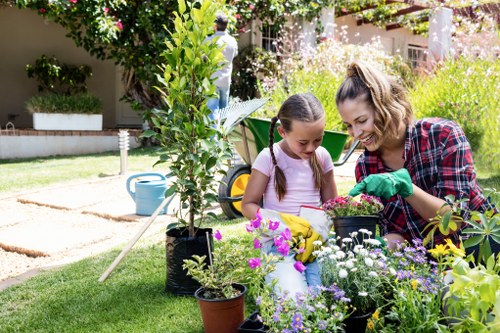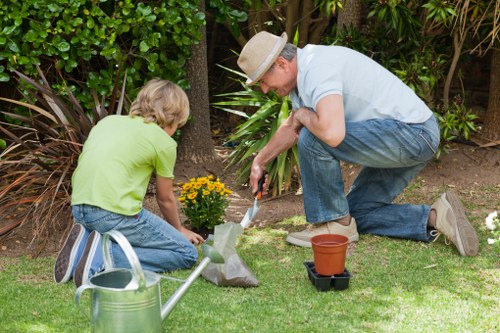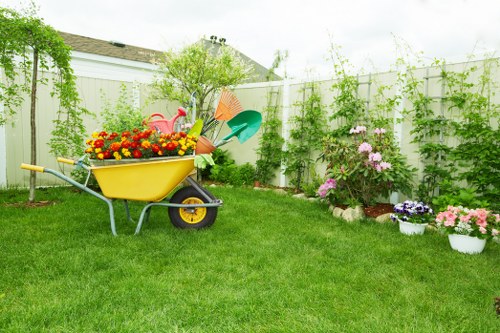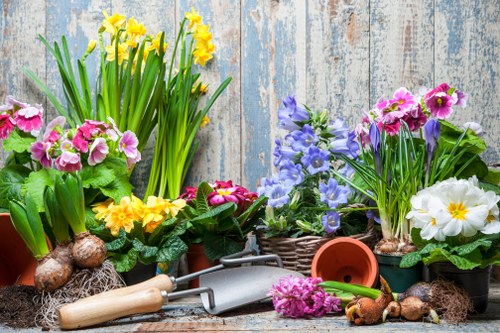Garden Maintenance in Woolwich

Maintaining a beautiful garden in Woolwich requires dedication, knowledge, and regular care. Whether you're a seasoned gardener or a novice, understanding the intricacies of garden maintenance can help you create a thriving outdoor space.
Woolwich's climate offers a unique set of challenges and opportunities for gardeners. From the temperate summers to the mild winters, each season brings its own set of tasks to ensure your garden remains lush and vibrant throughout the year.
In this comprehensive guide, we'll explore various aspects of garden maintenance in Woolwich, providing you with the insights and tips needed to keep your garden in pristine condition.
Seasonal Garden Maintenance

Gardening is a year-round endeavor, and each season in Woolwich presents different requirements for your garden. By adapting your maintenance routine to the changing seasons, you can ensure optimal growth and health for your plants.
Spring: This is the perfect time to prepare your garden for the growing season. Start by clearing out any debris from the winter months, pruning dead branches, and planting new flowers and shrubs.
Summer: Focus on regular watering, weeding, and monitoring for pests. Mulching can help retain moisture and suppress weeds, making your summer gardening tasks more manageable.
Lawn Care

A well-maintained lawn is the foundation of any beautiful garden. In Woolwich, lawn care involves a combination of mowing, fertilizing, and aerating to keep your grass healthy and lush.
Mowing: Regular mowing helps promote even growth and prevents weeds from taking over. Aim to mow your lawn once a week during the growing season.
Fertilizing: Applying fertilizer in the spring and autumn provides essential nutrients that your grass needs to thrive. Choose a fertilizer that's appropriate for your lawn type and follow the application instructions carefully.
Plant Care

Proper plant care is crucial for maintaining a vibrant and diverse garden. This includes watering, feeding, and protecting your plants from diseases and pests.
Watering: Consistent watering ensures that your plants get the moisture they need to grow. Early morning or late evening are the best times to water to minimize evaporation.
Feeding: Regular feeding with appropriate fertilizers can enhance plant growth and bloom. Organic options are available for those looking to maintain an eco-friendly garden.
Pest and Disease Management

Pests and diseases can quickly damage your garden if not addressed promptly. Integrated Pest Management (IPM) strategies can help you control these issues effectively.
Identification: Regularly inspect your plants for signs of pests or diseases. Early detection is key to preventing widespread damage.
Treatment: Use environmentally friendly treatments whenever possible. Neem oil, insecticidal soaps, and beneficial insects are effective options that minimize harm to your garden's ecosystem.
Pruning and Trimming
Pruning and trimming are essential practices to maintain the shape and health of your plants. They help remove dead or diseased branches, promote airflow, and encourage new growth.
When to Prune: The best time to prune most plants is during their dormant season. However, some flowering plants benefit from pruning after they bloom.
Tools: Invest in quality pruning tools to make the process easier and more effective. Clean, sharp shears reduce the risk of disease transmission between plants.
Techniques: Learn proper pruning techniques to avoid damaging your plants. Cutting at the right angle and location ensures healthy regrowth.
Sustainable Gardening Practices
Adopting sustainable gardening practices not only benefits the environment but also enhances the resilience of your garden. Here are some strategies to consider:
- Composting: Transform kitchen scraps and garden waste into nutrient-rich compost to enrich your soil.
- Rainwater Harvesting: Collect rainwater for irrigation to conserve water and reduce your water bills.
- Native Plants: Incorporate native plant species that are adapted to Woolwich's climate, requiring less water and maintenance.
Implementing these practices can lead to a more sustainable and low-maintenance garden.
Professional Garden Maintenance Services
While DIY garden maintenance can be rewarding, sometimes hiring professionals ensures that your garden receives the expertise it needs. Professional services offer a range of benefits:
- Expertise: Trained gardeners have the knowledge to handle complex maintenance tasks effectively.
- Time-Saving: Professionals can complete tasks more quickly, giving you more time to enjoy your garden.
- Customized Care: Tailored maintenance plans address the specific needs of your garden.
Consider engaging a local Woolwich garden maintenance service to keep your outdoor space in top condition year-round.
DIY vs. Professional Services
Deciding between DIY garden maintenance and hiring professionals depends on various factors, including your budget, time availability, and gardening expertise.
- Budget: DIY is often more cost-effective, but professional services can add value through their expertise.
- Time: If you have a busy schedule, professionals can handle maintenance tasks, freeing up your time.
- Expertise: For specialized tasks or tackling major issues, professionals are the better choice.
Assess your needs to determine the best approach for maintaining your Woolwich garden.
Benefits of Regular Garden Maintenance
Regular garden maintenance offers numerous advantages, enhancing both the aesthetic and functional aspects of your outdoor space.
- Healthier Plants: Consistent care ensures your plants remain healthy, reducing the risk of disease and pests.
- Enhanced Curb Appeal: A well-maintained garden boosts the overall appearance of your property.
- Increased Property Value: Quality garden maintenance can increase the market value of your home.
- Personal Well-being: Gardening can be a therapeutic activity, promoting relaxation and reducing stress.
Investing in regular garden maintenance pays off in both tangible and intangible ways.
Tips for Maintaining a Beautiful Garden
To keep your Woolwich garden looking its best, consider the following tips:
- Plan Your Garden: Design your garden layout to maximize space and enhance the natural beauty of your surroundings.
- Choose the Right Plants: Select plants that thrive in Woolwich's climate and soil conditions.
- Regular Weeding: Keep weeds under control to prevent them from competing with your plants for nutrients.
- Proper Mulching: Mulch helps retain soil moisture, suppress weeds, and improve soil quality.
- Consistent Watering: Establish a watering schedule to ensure your plants receive adequate moisture.
- Monitor for Pests: Regularly check for signs of pests and take prompt action if needed.
Implementing these practices will help you maintain a thriving and attractive garden throughout the year.
Choosing the Right Tools for Garden Maintenance
Having the right tools is essential for efficient garden maintenance. Invest in quality equipment to make your tasks easier and more effective.
- Hand Tools: Essential hand tools include pruners, trowels, and weeders. These are perfect for precision tasks and managing smaller areas.
- Lawn Care Equipment: A reliable lawnmower, aerator, and spreader are crucial for maintaining a healthy lawn.
- Watering Systems: Install sprinklers or drip irrigation systems to ensure consistent watering.
- Protective Gear: Gloves, hats, and knee pads protect you while working in the garden.
Proper maintenance of your tools prolongs their lifespan and ensures they perform optimally when needed.
Soil Health and Improvement
The foundation of a healthy garden lies in the quality of the soil. Understanding and improving your soil can lead to better plant growth and resilience.
Soil Testing: Conduct soil tests to determine pH levels and nutrient content. This information guides you in selecting the right amendments.
Adding Organic Matter: Incorporate compost or well-rotted manure to enhance soil structure and fertility.
Mulching: Mulch not only retains moisture but also adds organic matter to the soil as it decomposes.
Crop Rotation: Rotate plant families each season to prevent soil depletion and reduce pest buildup.
Irrigation and Water Management
Effective irrigation is critical for garden health, especially during the warmer months in Woolwich. Proper water management conserves resources and ensures your plants thrive.
- Drip Irrigation: Delivers water directly to the plant roots, minimizing evaporation and water waste.
- Rain Barrels: Collect rainwater to use during dry periods, reducing reliance on municipal water sources.
- Smart Controllers: Automated systems adjust watering schedules based on weather conditions, optimizing water usage.
Implementing efficient irrigation practices helps maintain a healthy garden while being environmentally responsible.
Garden Lighting
Garden lighting enhances the beauty and functionality of your outdoor space, allowing you to enjoy your garden even after dark.
- Path Lighting: Illuminate walkways to ensure safety and guide visitors through your garden.
- Accent Lighting: Highlight key features such as sculptures, water features, or special plants.
- String Lights: Add a warm and inviting ambiance to seating areas and outdoor gatherings.
Choose energy-efficient lighting options to reduce your environmental footprint while adding charm to your garden.
Hardscaping and Garden Structures
Incorporating hardscaping elements like patios, pergolas, and fences can add structure and functionality to your garden.
Patios: Provide a space for outdoor dining and relaxation, enhancing the usability of your garden.
Pergolas: Offer shade and support climbing plants, adding vertical interest to your garden.
Fences: Define garden boundaries, offer privacy, and can serve as a backdrop for climbing plants.
Well-designed garden structures complement your plants and create a harmonious outdoor environment.
Composting and Waste Management
Composting is an eco-friendly way to recycle garden waste and kitchen scraps, turning them into valuable soil amendments.
- Benefits: Reduces landfill waste, enriches soil, and decreases the need for chemical fertilizers.
- How to Compost: Create a compost pile or use a bin, layering green materials (e.g., kitchen scraps) with brown materials (e.g., leaves).
- Maintenance: Turn the compost regularly to aerate and speed up decomposition.
Effective composting enhances soil health and supports sustainable gardening practices.
Winter Garden Maintenance
Even during the colder months, garden maintenance remains important to prepare your garden for the next growing season.
Protection: Shield sensitive plants from frost by using covers or relocating them indoors.
Clean-Up: Remove fallen leaves and debris to prevent the spread of diseases and pests.
Planning: Use the winter months to plan and design new garden layouts or select new plant varieties for the upcoming year.
Garden Tools Maintenance
Proper care of your gardening tools ensures they remain effective and last longer, making maintenance tasks easier.
- Cleaning: Remove dirt and plant residue after each use to prevent rust and corrosion.
- Sharpening: Keep blades sharp for efficient cutting and pruning.
- Storage: Store tools in a dry, sheltered area to protect them from the elements.
Regular maintenance of your tools enhances their performance and extends their lifespan.
Creating a Garden Maintenance Schedule
Organizing your garden maintenance tasks into a schedule helps ensure that no aspect is overlooked and that your garden remains in top condition throughout the year.
- Weekly Tasks: Mowing the lawn, weeding flower beds, and inspecting plants for pests.
- Monthly Tasks: Fertilizing, pruning, and checking irrigation systems.
- Seasonal Tasks: Planting new blooms in spring, mulching in summer, and protecting plants in winter.
Using a calendar or garden planner can help you keep track of these tasks and maintain a consistent maintenance routine.
Leveraging Technology for Garden Maintenance
Modern technology offers various tools and devices to streamline garden maintenance and enhance efficiency.
- Smart Irrigation Systems: Automatically adjust watering schedules based on weather data.
- Garden Apps: Provide tips, reminders, and tracking for your gardening activities.
- Robotic Lawn Mowers: Automate the mowing process, saving you time and effort.
Integrating technology into your gardening routine can make maintenance tasks more manageable and enjoyable.
Conclusion
Effective garden maintenance in Woolwich involves a combination of regular care, knowledge of seasonal tasks, and the use of appropriate tools and techniques. Whether you choose to maintain your garden yourself or hire professional services, the key is consistency and attention to detail.
By following the tips and strategies outlined in this guide, you can create and sustain a beautiful, healthy garden that enhances your outdoor living space and provides enjoyment year-round.
Ready to transform your garden? Contact us today to book your garden maintenance service and enjoy a thriving garden in Woolwich.